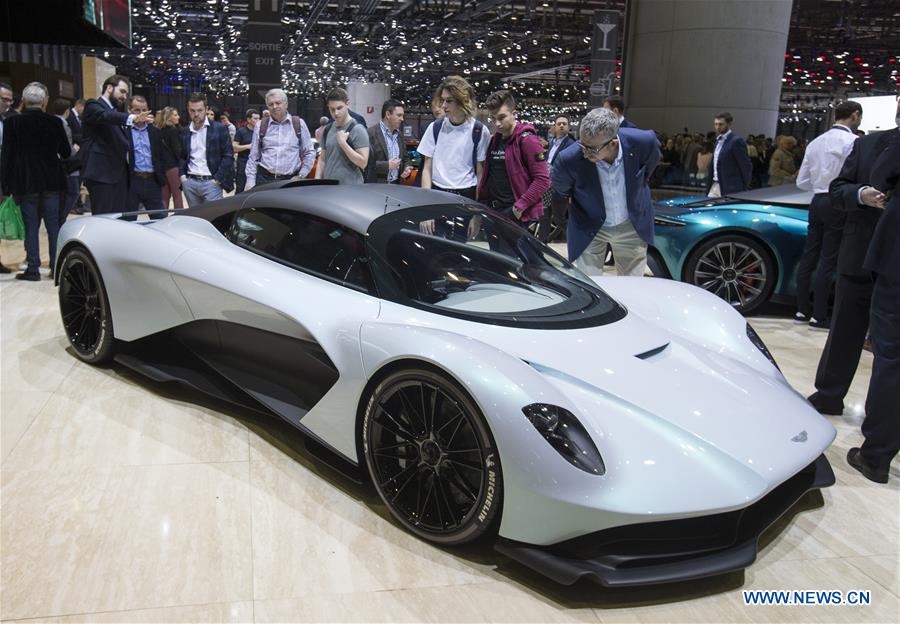
People watch the Aston Martin AM-RB 003 hypercar at the 89th Geneva International Motor Show in Geneva, Switzerland, March 7, 2019. The 89th Geneva International Motor Show officially opened to the public on Thursday, where electric cars have continued to take the lead as almost a consensus by many auto makers for the future development of the industry. (Xinhua/Xu Jinquan)
GENEVA, March 7 (Xinhua) -- The 89th Geneva International Motor Show (GIMS) was officially open to the public on Thursday, where electric cars have continued to take the lead as almost a consensus by many auto makers for the future development of the industry.
As the first annual European car show, GIMS is known as a vane of the automotive industry. At this year's show, this vane clearly points to electrification. Nearly half of the 150 world and European premieres launched at the show were pure electric vehicles or plug-in hybrid vehicles. The world's major automakers, such as Audi, BMW and Mercedes-Benz, all unveiled their electric or hybrid models at the center of their stage.
For the past few years Audi has shown its ambitions in the field of electric vehicles. Following the launch of the all-electric model e-tron quattro at GIMS last year, it brought this time the world premiere of the brand new pure electric concept model Q4 e-tron. A compact SUV, the Q4 has an amazing cruising range of 450 km and is expected to be put into mass production by the end of 2020.
Besides the Q4, Audi also unveiled four pure electric models and four plug-in hybrids, saying that the company will fully expand its electrification strategy by launching 12 electric models for major global markets by 2025, when its electric vehicles are expected to account for one third of its global sales.
Volkswagen also introduced its all-terrain electric concept model ID.BUGGY, which eliminates the design of canopy and doors and is made of waterproof material. The new model chooses to integrate a high-voltage battery pack into the bottom of the car, resulting in a cruising range of up to 250 km even when challenging various terrain conditions. Volkswagen said it plans to launch 10 electric models in total by 2025.
Mercedes-Benz has taken a different approach by selecting various subdivided markets. Its new EQV concept car, one of the world's premieres at this year's auto show, is defined as the first pure electric MPV in luxury cars. It has a cruising range of up to 400 km and can travel 100 km with just 15 minutes of charging.
Meanwhile, Benz also launched the first pure electric racing model, the EQ Silver Arrow 01's. The auto giant said it's investing 10 billion euros (about 11.26 billion U.S. dollars) in developing electric vehicles and building a new global battery production network.
This year's GMIS saw the BMW launching six world's premiere plug-in hybrids, including the hybrid xDrive45e of the X5 series. BMW CEO Harald Kruger said by the end of next year, BMW will have launched more than 10 new and upgraded electric models, while as the same time providing convenient charging services for consumers around the world.
Although Volvo did not set up a stage at the auto show, the group's sub-brand Polestar launched its first pure electric car Polestar 2. As a high-performance electric brand owned by Volvo, Polestar was founded in 2017 and released the hybrid Polestar 1 at GIMS last year. Polestar 2 will begin mass production during the second half of 2019 and is expected to cooperate with Chinese companies such as AutoNavi and iFlytek in the future when entering the Chinese market.
Analysts believe that major automakers have all launched their strategies for electric vehicles, which is somehow related to the new auto emission reduction regulations among EU countries. The European Parliament and EU countries reached an agreement in December last year that aims to reduce by 2030 the CO2 emissions of new cars in the EU by 37.5 percent compared with 2021.











